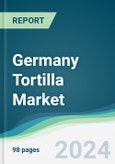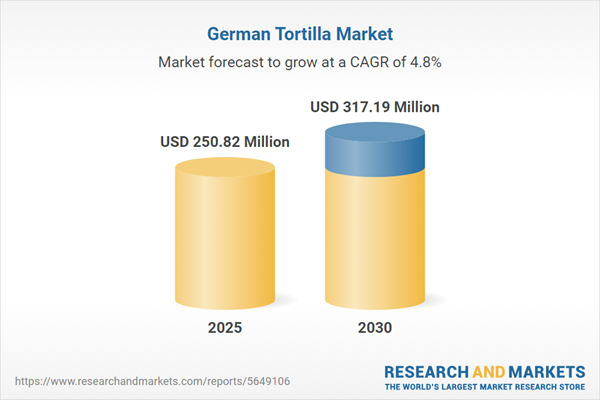The German tortilla market is driven by the growing veganism among the population. Germany is comprised of the world's wealthiest consumers. It is the second-largest importer and third-largest exporter of consumer-oriented agricultural products worldwide. Over the past few years, the German food market experienced rapid growth in vegan food development and restaurants. Plant-based alternatives can now be found in every supermarket.
Additionally, Germany is the primary producer of cereals in Europe. Germany harvested 43.5 million tonnes of cereals in 2022, which is 16% of the EU total. An estimated 270.9 million tonnes of cereals were harvested across the EU in 2022.
During the forecast period, the corn segment held the greatest share of the Germantortilla market. The maize tortilla is the most classic tortilla type. An industrial nixtamalization technology is used to make many maize tortillas in supermarkets. Traditional tortillas are made entirely of maize, although they can alternatively be made entirely with dehydrated maize flour. Corn tortillas are low in fat, salt, potassium, calcium, and fiber, as well as being low in fat. Because of their changing lifestyles, consumers are increasingly concerned about their health, which has led to the adoption of this product.
Germany tortilla market drivers
Growing number of vegan and vegetarian population
A growing number of vegan and vegetarian populations in Germany is one of the main reasons for the demand for tortillas. This trend has been strong in recent years. According to a recent survey by USDA (U.S. Department of Agriculture), nearly 8 million people followed a vegetarian diet and 1.58 million people identified themselves as vegan in 2022. This implies nearly 10 million people are choosing to follow a diet without meat and fish or entirely without animal products.German people are generally very eco-conscious and health-conscious, and they are very much aware of the environmental effects of meat consumption. The benefits attached to tortillas are creating demand for the tortillas product in the recent period. Tortillas are a good source of fiber and have a large amount of folic acid. This is beneficial for pregnant women. It also benefits people with healthier nails, hair, and skin.
Reasons for buying this report:
- Insightful Analysis: Gain detailed market insights covering major as well as emerging geographical regions, focusing on customer segments, government policies and socio-economic factors, consumer preferences, industry verticals, other sub-segments.
- Competitive Landscape: Understand the strategic maneuvers employed by key players globally to understand possible market penetration with the correct strategy.
- Market Drivers & Future Trends: Explore the dynamic factors and pivotal market trends and how they will shape up future market developments.
- Actionable Recommendations: Utilize the insights to exercise strategic decision to uncover new business streams and revenues in a dynamic environment.
- Caters to a Wide Audience: Beneficial and cost-effective for startups, research institutions, consultants, SMEs, and large enterprises.
What do businesses use our reports for?
Industry and Market Insights, Opportunity Assessment, Product Demand Forecasting, Market Entry Strategy, Geographical Expansion, Capital Investment Decisions, Regulatory Framework & Implications, New Product Development, Competitive IntelligenceReport Coverage:
- Historical data & forecasts from 2022 to 2030
- Growth Opportunities, Challenges, Supply Chain Outlook, Regulatory Framework, Customer Behaviour, and Trend Analysis
- Competitive Positioning, Strategies, and Market Share Analysis
- Revenue Growth and Forecast Assessment of segments and regions including countries
- Company Profiling (Strategies, Products, Financial Information, and Key Developments among others)
The Germany tortilla market is segmented and analyzed as follows:
By Product Type
- Tostadas
- Taco Shells
- Corn Tortilla
- Flour Tortilla
- Tortilla Chips
By Source
- Corn
- Wheat
By Processing Type
- Fresh
- Frozen
By Distribution Channel
- Online
- Restaurants
- Supermarkets
- Others
Table of Contents
Companies Mentioned
- La Tortilla Factory
- Freed Foods
- Paulig Group (Santa Maria)
- DIJO
- GRUMA, S.A.B. de C.V
- Komali Tortillas
- Tlaxcalli
- Mex-Al
- Theodor Kattus GmbH
- Mestemacher Group
- Pepsico
Table Information
| Report Attribute | Details |
|---|---|
| No. of Pages | 98 |
| Published | December 2024 |
| Forecast Period | 2025 - 2030 |
| Estimated Market Value ( USD | $ 250.82 Million |
| Forecasted Market Value ( USD | $ 317.19 Million |
| Compound Annual Growth Rate | 4.8% |
| Regions Covered | Germany |
| No. of Companies Mentioned | 11 |









